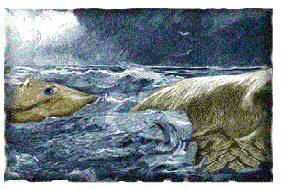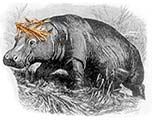|


The legend of the Leviathan is, like the others retold
in Louis Ginzberg's classic work Legends of the Bible, a variation
of the stories in the Scriptures as told and retold in the ancient east
since the days of Abraham — in synagogues and churches and the in homes
of a hundred generations of people.
Prof. Ginzberg culled them from
a vast literature, scattered over many countries and centuries (from
the Babylonian and Palestinian Talmuds to compendia of legends compiled
from the third century late into the Middle Ages, to the new harvest
of folk tales and legends of the Bible which grew up in the eighteenth
century during the period of religious revival in Eastern Europe).
[*] |
On the fifth day of creation,
God took fire and water, and out of these two elements He made the fishes of
the sea. The animals in the water are much more numerous than those on land.
For every species on land, excepting only the weasel, there is a corresponding
species in the water, and, besides, there are many found only in the water.
The ruler over the sea-animals is leviathan. With all the other fishes
he was made on the fifth day. Originally, he was created male and female,
like all the other animals. But when it appeared that a pair of these
monsters might annihilate the whole earth with their united strength,
God killed the female. So enormous is leviathan that to quench his thirst
he needs all the water that flows from the Jordan into the sea. His food
consists of the fish which go between his jaws of their own accord. When
he is hungry, a hot breath blows from his nostrils, and it makes the waters
of the great sea seething hot....
But leviathan is more than merely large and strong; he is wonderfully
made besides. His fins radiate brilliant light, the very sun is obscured
by it, and also his eyes shed such splendor that this marvelous beast
is the plaything of God, in whom He takes His pastime.
There is but one thing that makes leviathan repulsive —
his foul smell, which is so strong that if it penetrated thither, it would
render Paradise itself an impossible abode.
 The
real purpose of leviathan is to be served up as a dainty to the pious in the
world to come. The female was put into brine as soon as she was killed, to be
preserved against the time when her flesh will be needed. The male is destined
to offer a delectable sight to all beholders before he is consumed. The
real purpose of leviathan is to be served up as a dainty to the pious in the
world to come. The female was put into brine as soon as she was killed, to be
preserved against the time when her flesh will be needed. The male is destined
to offer a delectable sight to all beholders before he is consumed.
When his last hour arrives, God will summon the angels into combat with the
monster. But no sooner will leviathan cast his glance at them, than they will
flee in fear and dismay from the field of battle. They will return to the charge
with swords, but in vain, for his scales can turn back steel like straw. They
will be equally unsuccessful when they attempt to kill him by throwing darts
and slinging stones; such missiles will rebound without leaving the least impression
on his body.
 Disheartened,
the angels will give up the combat, and God will command leviathan and behemot
(king of the beasts) to enter into a duel with each other. The issue will be
that both drop dead, behemot slaughtered by a blow of leviathan's fins, and
leviathan killed by a lash of behemot's tale. From the skin of leviathan God
will construct tens to shelter companies of the pious, while they enjoy the
dishes made of his flesh. The amount assigned to each of the pious will be in
proportion to his deserts, and none will envy or begrudge the other his better
share. Disheartened,
the angels will give up the combat, and God will command leviathan and behemot
(king of the beasts) to enter into a duel with each other. The issue will be
that both drop dead, behemot slaughtered by a blow of leviathan's fins, and
leviathan killed by a lash of behemot's tale. From the skin of leviathan God
will construct tens to shelter companies of the pious, while they enjoy the
dishes made of his flesh. The amount assigned to each of the pious will be in
proportion to his deserts, and none will envy or begrudge the other his better
share.
What is left of leviathan's skin will stretched out over Jerusalem as a canopy,
and the light streaming from it will illumine the whole world. What is left
of his flesh after the pious have appeased their appetite, will be distributed
among the rest of men, to carry on traffic therewith.
Among the fishes there are also wonderful creatures, the sea-goats and the dolphins,
not to men leviathan. A seafaring man once saw a sea-goat on whose horns the
words were inscribed: "I am a little sea animals, yet I traversed three
hundred parasangs to offer myself as food to the leviathan." The dolphins
are half man and half fish; they even have sexual intercourse with human beings;
therefore they are called also "sons of the sea," for in a sense they
represent the human kind in the waters.
Commentary by Shalom Spiegel
Many of the legends of the Bible borrow freely from both folk
tale and folk belief. The cycles of legends about Leviathan seems to revert
to ancient heathen myths which the account of creation in Genesis sought to
supplant or suppress. We read how Leviathan is described as the mightiest wonder
of creation. These fantastic details [the slain female partner, Behemot's future
battle against Leviathan, the uses to which the Leviathan's dead corpse will
be put, etc. etc.] unblushingly echo the Old Babylonian epic of creation, going
back to the early second millennium BCE.
The Babylonian gods all shrank in dread before Tiamat, the monster of the sea
and her fierce crew, until Marduk, the chief god of Babylon, defeated her, and
split her like a shellfish into two parts. Half of her he set up as a canopy
of heaven, assigning stations in the sky to the great gods and their constellations
to cheer with light the twelve months of the year.
Such palpable reminiscences or relics of pagan mythology in the legends of the
Bible will seem surprising. Reported in the name of renowned scholars flourishing
in the third century, they clash patently not only with the whole legacy of
the biblical faith, but with the austere monotheism which these founders of
rabbinic Judaism consistently maintained and invariably sought to implant and
enforce in their people.
It is altogether out of the question to consider such cosmogonic fancies as
the invention of the period or personalities to which they are ascribed in the
sources. Obviously the stories precede their storytellers by long centuries,
often by more than a millennium, harking back to the earliest tales o their
remote ancestors or heathen neighbors. The imaginative accounts of strife with
monsters of the deep, or the Princes of Darkness or of the Sea, with rebellious
waters and insurgent stars, would appear most reasonably to be but splinter
of ancient myths from pre-biblical or early biblical days.
These remnants of dim sagas and residues of faded traditions, frowned upon by
the makers of the Bible and discarded by them, survived, as it were, subterraneously
for countless generation, down to the last centuries of antiquity, or even the
early centuries of the Middle Ages — an amazing testimony to the tenacity
of folk memories.
|
Illustrations:
Folk art depiction of the leviathan and the "wild ox" who
are to serve as food for the righteous in the world to come (Ukraine and
Poland, 19th century). |
|
[*] When
Louis Ginzberg died in 1953, he was recognized as the world's upstanding
scholar in the field of Talmudic learning. His studies were carried on at
the universities of Berlin, Strassburg and Heidelberg, and since 1902 at
the Jewish Theological Seminary in New York, where he served with distinction
as Professor of Talmud for more than half a century. The Legend of the
Jews, a massive seven-volume work with notes, written in German, and
translated into some forty languages, was originally published for scholars
(the first volume was published in 1909). [Back] |
|
 From
a shorter and simpler edition, Legends of the Bible that
was published by Jewish Publication Society in 1975. From
a shorter and simpler edition, Legends of the Bible that
was published by Jewish Publication Society in 1975. |
FISH
Table of Contents
|